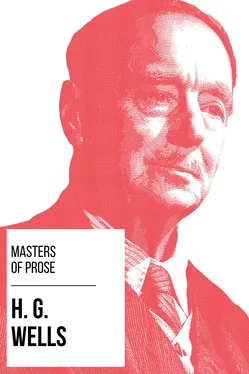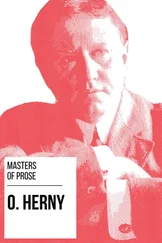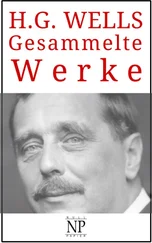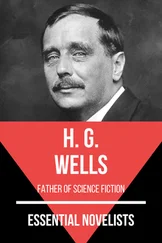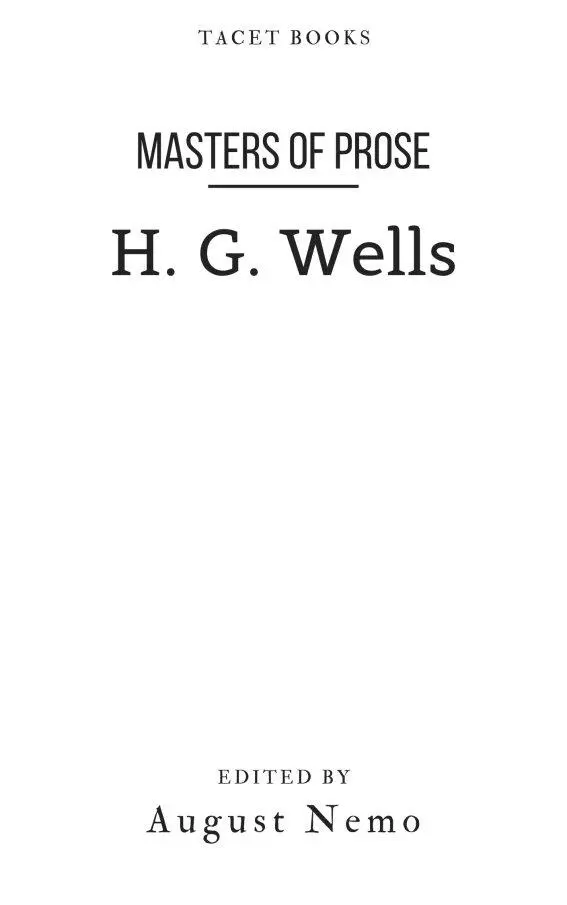
Title Page
Author
H.G. Wells
Time Machine
The War of the Worlds
A Dream Of Armageddon
The Crystal Egg
The Man Who Could Work Miracles
The Flowering of the Strange Orchid
The Sea Riders
The Apple
The Argonauts of the Air
About the Publisher


Herbert George Wells (September 21, 1866 – August 13, 1946), better known as H. G. Wells, was an English author of science fiction novels such as The Time Machine, The War of the Worlds, The Invisible Man, and The Island of Doctor Moreau. H.G. Wells is often considered to be remarkable for his ability to accurately forecast a number of technological and scientific developments, including the invention of the atomic bomb. Wells was a master prose stylist, and his novels are well-regarded not only because they provide insights into science and society, but also because they are easy and entertaining to read.
Wells was a prolific writer of both fiction and non-fiction, producing works in many different genres, including contemporary novels, history, and social commentary. He was also an outspoken socialist. His later works become increasingly political and didactic, and only his early science fiction novels are widely read today. Wells, along with Hugo Gernsback and Jules Verne, is sometimes referred to as "The Father of Science Fiction," as it is almost impossible to imagine science fiction without Wells' contributions.


A biography by J.D. Beresford
INTRODUCTION
THE NORMALITY OF MR WELLS
In his Preface to the Unpleasant Plays, Mr Shaw boasts his possession of "normal sight." The adjective is the oculist's, and the application of it is Mr Shaw's, but while the phrase is misleading until it is explained to suit a particular purpose, it has a pleasing adaptability, and I can find none better as a key to the works of Mr H.G. Wells.
We need not bungle over the word "normal," in any attempt to meet the academic objection that it implies conformity to type. In this connection, the gifted possessor of normal sight is differentiated from his million neighbours by the fact that he wears no glasses; and if a few happy people still exist here and there who have no need for the mere physical assistance, the number of those whose mental outlook is undistorted by tradition, prejudice or some form of bias is so small that we regard them as inspired or criminal according to the inclination of our own beloved predilection. And no spectacles will correct the mental astigmatism of the multitude, a fact that is often a cause of considerable annoyance to the possessors of normal sight. That defect of vision, whether congenital or induced by the confinements of early training, persists and increases throughout life, like other forms of myopia. The man who sees a ball as slightly flattened, like a tangerine orange too tightly packed (an "oblate spheroid" would be the physicist's brief description), seeks the society of other men who share his illusion; and the company of them take arms against the opposing faction, which is confirmed in the belief that the ball is egg-shaped, that the bulge, in fact, is not "oblate" but "prolate."
I will not elaborate the parable; it is sufficient to indicate that in my reading of Mr Wells, I have seen him as regarding all life from a reasonable distance. By good fortune he avoided the influences of his early training, which was too ineffectual to leave any permanent mark upon him. His readers may infer, from certain descriptions in Kipps, and The History of Mr Polly, that Wells himself sincerely regrets the inadequacies of that "private school of dingy aspect and still dingier pretensions, where there were no object lessons, and the studies of book-keeping and French were pursued (but never effectually overtaken) under the guidance of an elderly gentleman, who wore a nondescript gown and took snuff, wrote copperplate, explained nothing, and used a cane with remarkable dexterity and gusto." But, properly considered, that inadequate elderly gentleman may be regarded as our benefactor. If he had been more apt in his methods, he might have influenced the blessed normality of his pupil, and bound upon him the spectacles of his own order. Worse still, Mr Wells might have been born into the leisured classes, and sent to Eton and Christchurch, and if his genius had found any expression after that awful experience, he would probably, at the best, have written polite essays or a history of Napoleon, during the intervals of his leisured activity as a member of the Upper House.
Happily, Fate provided a scheme for preserving his eyesight, and pitched him into the care of Mr and Mrs Joseph Wells on the 21st September 1866; behind or above a small general shop in Bromley. Mrs Wells was the daughter of an innkeeper at Midhurst and had been in service as a lady's maid before her marriage. Joseph Wells had had a more distinguished career. He had been a great Kent bowler in the early sixties, and it must have been, I think, only the year before the subject of our essay appeared at Bromley that his father took four wickets with consecutive balls and created a new record in the annals of cricket. The late Sir Francis Galton might have made something out of this ancestry; I must confess that it is entirely beyond my powers, although I make the reservation that we know little of the abilities of H.G. Wells' mother. She has not figured as a recognisable portrait in any of his novels.
The Bromley shop, like most of its kind, was a failure. Moderate success might have meant a Grammar School for young Wells, and the temptations of property, but Fate gave our young radical another twist by thrusting him temporarily within sight of an alien and magnificent prosperity, where as the son of the housekeeper at Up Park, near Petersfield, he might recognise his immense separation from the members of the ruling class, as described in Tono-Bungay.
After that came "the drapery," first at Windsor and then at Southsea; but we have no autobiography of this period, only the details of the trade and its circumstances. For neither Hoopdriver, nor Kipps, nor Polly could have qualified for the post of assistant at Midhurst Grammar School, a position that H.G. Wells obtained at sixteen after he had broken his indentures with the Southsea draper.
At this point we come up with Mr Lewisham, and may follow him in his experiences after he obtained what was, in fact, a scholarship at the Normal School of Science, South Kensington; but we drop that hero again before his premature marriage and failure, to follow the uncharted course of Wells obtaining his B.Sc. with first-class honours; passing to an assistant-mastership at the Henley House School, St John's Wood, and so coming by way of tutor, lecturer and demonstrator to the beginnings of journalism, to the breaking of a blood-vessel and thence, without further diversion, to the trade of letters, somewhere in the summer of 1893.
Читать дальше
